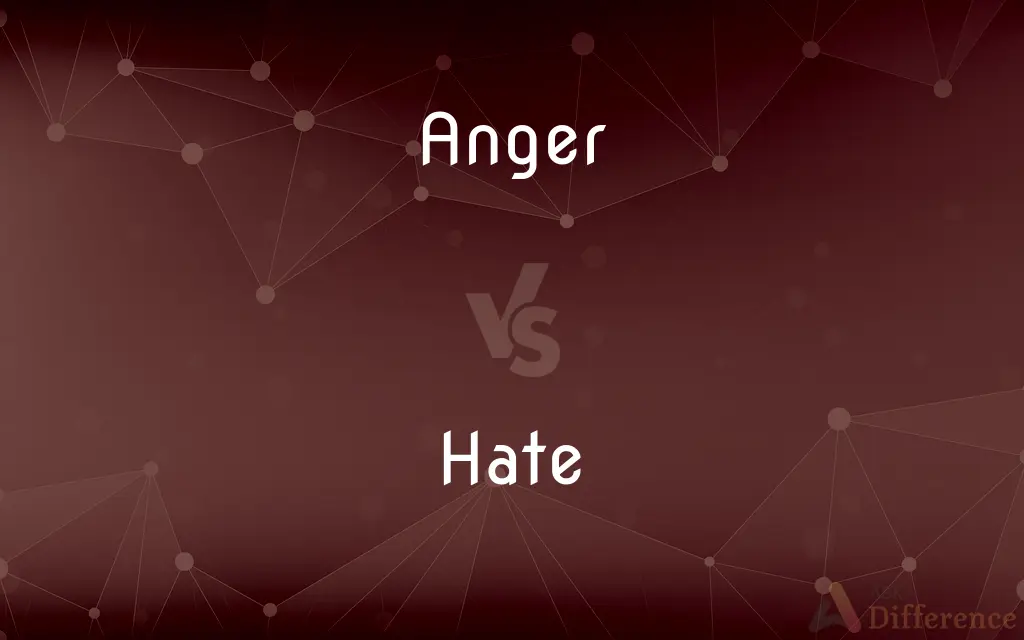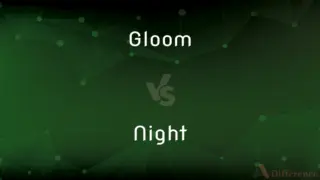Anger vs. Hate — What's the Difference?
By Tayyaba Rehman — Updated on September 21, 2023
Anger is an intense emotional response to displeasure or frustration, while hate is a deep, sustained feeling of aversion or hostility towards someone or something.

Difference Between Anger and Hate
Table of Contents
ADVERTISEMENT
Key Differences
Anger is a strong emotion that emerges when one feels wronged or believes an injustice has occurred. It's immediate and can be triggered by a variety of circumstances. Anger, when managed properly, might not necessarily have negative consequences. In some cases, anger can even be constructive, spurring individuals to address problems or stand up for their beliefs.
Hate, on the other hand, is a prolonged sentiment of intense dislike or aversion. It is more deep-rooted and persistent than anger. Unlike the fleeting nature of anger, hate can endure and fester for long periods. Hate can be directed towards individuals, groups, objects, or concepts and is often based on fear, misunderstanding, or past negative experiences.
Anger is usually reactive and can be seen as a natural emotional response to certain provocations or threats. It can arise suddenly and might dissipate once the triggering situation is resolved. Conversely, hate involves a more deliberate aversion and requires time to develop. It often results from sustained negative experiences or deep-seated prejudices.
While anger can sometimes lead to hate if not addressed, the two are distinct. For instance, one might feel anger after a disagreement with a friend but won't necessarily hate them. Hate, due to its enduring nature, can lead to more long-term negative actions, such as prejudice, discrimination, or even violence.
Comparison Chart
Nature
Immediate emotional response
Deep, sustained feeling
ADVERTISEMENT
Duration
Typically short-lived
Long-lasting
Trigger
Specific events or provocations
Prolonged negative experiences or prejudices
Outcome
Can be resolved quickly
Often leads to prolonged negativity or actions
Intensity
Can be fleeting
More enduring and deep-rooted
Compare with Definitions
Anger
A strong emotional reaction to perceived wrongs.
His deception filled her with anger.
Hate
Intense or passionate dislike towards someone or something.
He developed a hate for injustice.
Anger
Intense feeling demanding action or attention.
The manager's neglect sparked anger in the employees.
Hate
Deep-rooted aversion based on fear or past experience.
After the betrayal, she felt nothing but hate for him.
Anger
An emotion resulting from displeasure or frustration.
She couldn’t contain her anger when the vase broke.
Hate
A long-term feeling of hostility.
Their rivalry grew into mutual hate.
Anger
Natural emotion stemming from threats or provocations.
His unkind words stirred anger in her heart.
Hate
A sentiment leading to prejudice or discrimination.
Hate can be the root of many societal problems.
Anger
Anger, also known as wrath or rage, is an intense emotional state involving a strong uncomfortable and non-cooperative response to a perceived provocation, hurt or threat.A person experiencing anger will often experience physical effects, such as increased heart rate, elevated blood pressure, and increased levels of adrenaline and noradrenaline. Some view anger as an emotion which triggers part of the fight or flight response.
Hate
Extreme repugnance or rejection.
His hate for lies made him value honesty above all.
Anger
A strong feeling of annoyance, displeasure, or hostility
The colonel's anger at his daughter's disobedience
Hate
To feel strong dislike for or hostility toward
Rivals who hate each other.
Anger
Fill (someone) with anger; provoke anger in
He was angered that he had not been told
She was angered by his terse answer
Hate
To feel dislike or distaste for
Hates washing dishes.
Hates to get up early.
Anger
A strong feeling of displeasure or hostility.
Hate
To be disinclined (to do something) out of politeness or a need to apologize
I hate to interrupt, but can I ask you a quick question?.
Anger
To make angry; enrage or provoke.
Hate
To feel hatred.
Anger
To become angry
She angers too quickly.
Hate
Intense animosity or dislike; hatred.
Anger
A strong feeling of displeasure, hostility or antagonism towards someone or something, usually combined with an urge to harm, often stemming from perceived provocation, hurt, or threat.
You need to control your anger.
Hate
An object of hatred.
One of my pet hates is traffic wardens.
Anger
(obsolete) Pain or stinging.
Hate
Hatred.
He gave me a look filled with pure hate.
Anger
(transitive) To cause such a feeling of antagonism in.
He who angers you conquers you.
Hate
(Internet slang) Negative feedback, abusive behaviour.
There was a lot of hate in the comments on my vlog about Justin Bieber from his fans.
Anger
(intransitive) To become angry.
You anger too easily.
Hate
(transitive) To dislike intensely or greatly.
Anger
Trouble; vexation; also, physical pain or smart of a sore, etc.
I made the experiment, setting the moxa where . . . the greatest anger and soreness still continued.
Hate
(intransitive) To experience hatred.
Do not fear; he who fears hates; he who hates kills. — attributed to Gandhi
Anger
A strong passion or emotion of displeasure or antagonism, excited by a real or supposed injury or insult to one's self or others, or by the intent to do such injury.
Anger is likeA full hot horse, who being allowed his way,Self-mettle tires him.
Hate
To have a great aversion to, with a strong desire that evil should befall the person toward whom the feeling is directed; to dislike intensely; to detest; as, to hate one's enemies; to hate hypocrisy.
Whosoever hateth his brother is a murderer.
Anger
To make painful; to cause to smart; to inflame.
He . . . angereth malign ulcers.
Hate
To be very unwilling; followed by an infinitive, or a substantive clause with that; as, to hate to get into debt; to hate that anything should be wasted.
I hate that he should linger here.
Anger
To excite to anger; to enrage; to provoke.
Taxes and impositions . . . which rather angered than grieved the people.
Hate
To love less, relatively.
Anger
A strong emotion; a feeling that is oriented toward some real or supposed grievance
Hate
Strong aversion coupled with desire that evil should befall the person toward whom the feeling is directed; as exercised toward things, intense dislike; hatred; detestation; - opposed to love.
For in a wink the false love turns to hate.
Anger
The state of being angry
Hate
The emotion of hate; a feeling of dislike so strong that it demands action
Anger
Belligerence aroused by a real or supposed wrong (personified as one of the deadly sins)
Hate
Dislike intensely; feel antipathy or aversion towards;
I hate Mexican food
She detests politicians
Anger
Make angry;
The news angered him
Anger
Become angry;
He angers easily
Anger
A passionate response to a triggering event.
The unfair decision evoked anger among the team.
Common Curiosities
How can one differentiate between anger and hate?
Anger is a more immediate and often fleeting response, while hate is a sustained and deep-seated feeling.
Is it natural to feel anger?
Yes, anger is a natural emotion in response to certain provocations.
Are anger and hate always negative?
While often perceived negatively, anger can be constructive. Hate, however, is typically harmful.
How can one manage anger effectively?
Techniques like deep breathing, taking a break, or seeking therapy can help manage anger.
Can anger be justified?
Depending on the situation, anger can be a justified response to wrongdoing or threats.
Can anger lead to hate?
Yes, if anger isn't addressed, it can evolve into hate over time.
Is hate always directed towards people?
No, hate can be directed towards objects, concepts, or even abstract ideas.
Is hate learned or inherent?
Hate is often learned from negative experiences, misunderstandings, or societal influences.
What are the long-term effects of harboring hate?
Holding onto hate can lead to stress, isolation, and physical or mental health issues.
Are there physiological responses associated with anger?
Yes, anger can lead to increased heart rate, blood pressure, and adrenaline levels.
Share Your Discovery

Previous Comparison
Automatized vs. Automated
Next Comparison
Gloom vs. NightAuthor Spotlight
Written by
Tayyaba RehmanTayyaba Rehman is a distinguished writer, currently serving as a primary contributor to askdifference.com. As a researcher in semantics and etymology, Tayyaba's passion for the complexity of languages and their distinctions has found a perfect home on the platform. Tayyaba delves into the intricacies of language, distinguishing between commonly confused words and phrases, thereby providing clarity for readers worldwide.














































